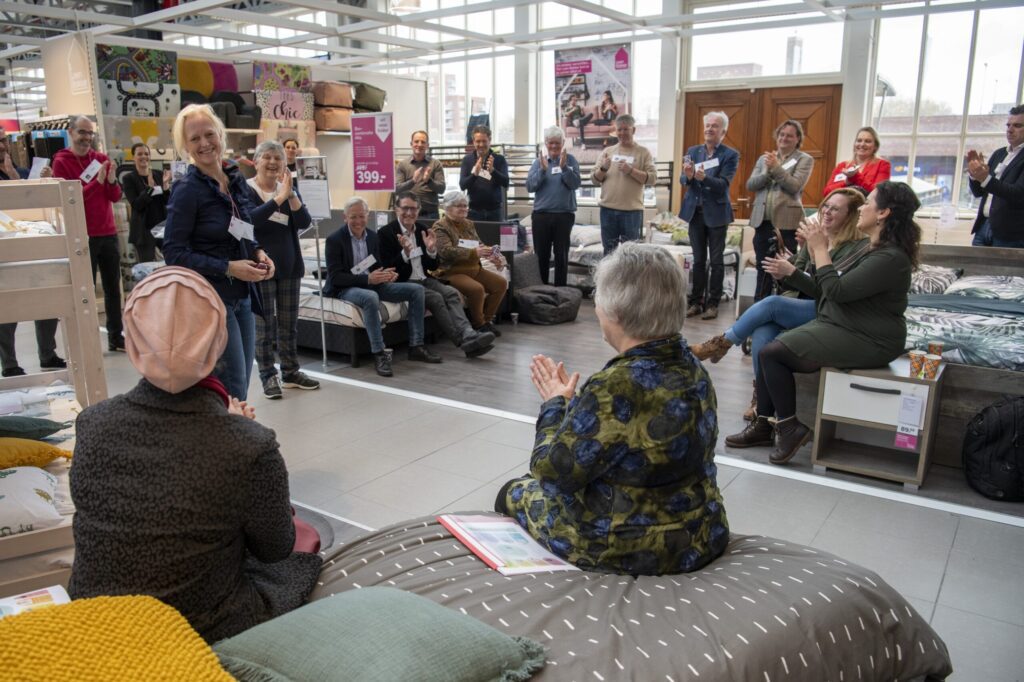Protecting Children’s Rights in the Netherlands
From the Famvin Homeless Alliance.
Visit their website
According to recent figures published by Statistics Netherlands (CBS)[1], 209,000 children in the Netherlands are living at risk of poverty, with their parents earning a salary below the national low-income threshold. The ‘Team against Poverty’ in Tilburg – with the help of many volunteers and welfare organizations – is helping children to exit the cycle of poverty with the project ‘Beds in the Netherlands’, part of the “13 Houses” Campaign.
The project fights an ‘invisible’ form of poverty by providing beds, mattresses and bedding to poor families in Tilburg. In these families, there is often not enough money to buy a bed with warm blankets. However, parents prefer not to tell this to social services, because they are afraid that they think of being judged as ‘bad’ parents who do not love their child enough to give them a decent bed.
382 children enjoy a healthy night’s sleep
Over three years after the launch of the Bed Campaign, the Team against Poverty takes stock: 187 beds, 49 bunk beds, 6 cots and 37 products for furnishing children’s rooms! Some 382 children in 142 households can enjoy a healthy night’s sleep thanks to the Bed Campaign in Tilburg. A great result, but it has not yet solved the sleep poverty problem.
“Can I tell you a secret? For the first time in my life, I have my own bed. I am very happy with it, but I don’t want to tell anyone because I am ashamed that this is my first bed.”
This statement by an 11-year-old girl prompted Marja Wittenbols of the Team against Poverty (Elftal tegen Armoede) to put the dormant sleeping poverty problem on the map. Via the Johan Stekelenburg Foundation, the subject ended up at Lions Club Regte Heide, which then developed into a full project with parties from their network. Very much needed, because on enquiry it turned out that not every child in the Dutch city of Tilburg had a good bed or decent mattress.
Homemade mattresses
As social workers explained in the concluding meeting of the Bed Campaign, the demand for a mattress or a new bed rarely comes from the people themselves. It is the social workers who get behind the front door who identify and address the problem. What they find is sometimes hard to comprehend. Home-made mattresses, slatted bases made of crates, bedrooms with bare concrete floors or living rooms with four mattresses in them that also serve as bedrooms. Often, behind this glaring problem lie many more underlying challenges. And unfortunately, the stories do not turn out to be unique.
A well-moving train
“It is more than just providing a bed,” says Karin de Jong, who brought all parties together on behalf of the Johan Stekelenburg Foundation. “It is also about making contact: we get behind the front door, pick up signals and discuss with the families what we can do for them. In no time, we rigged up a well-moving train with all parties. It ran from the moment of ‘there is a need for a bed’, to the delivery and placement of the bed”.
This was an example of a beautiful cooperation between sponsors such as: Leen Bakker; Dreamboulevard Oisterwijk; Sisters SCMM; the Vincentius Society; and Brothers CMM, and referrers such as: IMW Tilburg; R-Newt; ContourdeTwern; the Team against Poverty; De Vonk; Foundation ZorgSaam; the MOM; neighbourhood councils; and the Johan Stekelenburg Foundation.
“It should not have been necessary”
That the project has now ended does not mean the problem has been fully solved. According to the Central Planning Bureau’s (CPB) projections, one million people in the Netherlands will be living below the poverty line by 2024. We expect that the bedroom poverty problem will grow proportionally. Councillor Esmah Lahlah reiterated the importance of good sleep in her speech of thanks. “A prerequisite for a good start and optimal talent development. Every child deserves an equal chance. I therefore hope that the success of this action can be continued in a subsequent project.”
The fact that the children’s beds are not currently accommodated within the municipality’s Special Assistance – whether that might become possible in the future – will be addressed by the councillor in the city council. The councillor concluded, “I think the Bed Campaign can rightly be called successful. Although I would prefer that it had not been necessary to be continued”.
Originally published in Stadsnieuws Tilburg on April 8, 2023. Text: Etiënne van Breugel.
[1] https://www.iamexpat.nl/expat-info/dutch-expat-news/cbs-over-200000-children-netherlands-live-risk-poverty
Source: https://vfhomelessalliance.org/









0 Comments